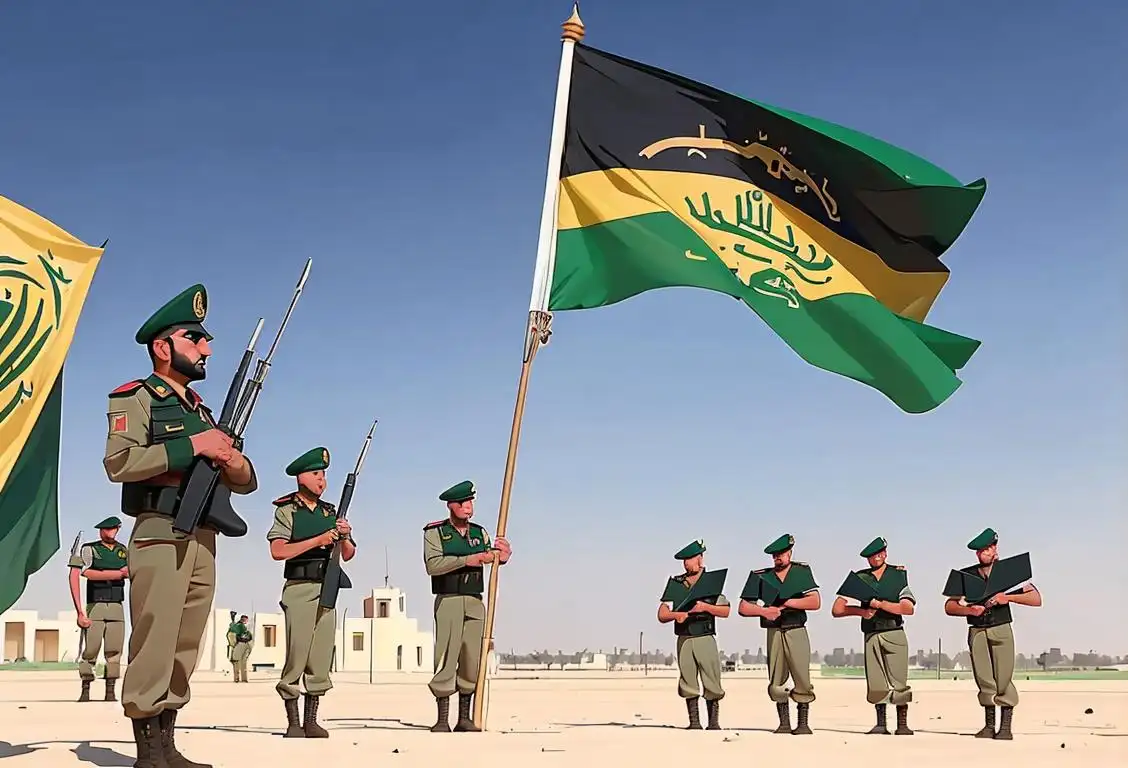National Iraqi Army Day

Are you ready to celebrate National Iraqi Army Day? Get ready for a day filled with admiration for the brave men and women who protect and serve their country. Join us as we dive into the internet and national history of this special day!
When is Iraqi Army Day?
It's national iraqi army day on the 6th January.
The Internet Side of National Iraqi Army Day
On January 6, 2016, the internet was abuzz with 53 mentions of National Iraqi Army Day. People from all over the globe took to social media to express their appreciation for the Iraqi Army's dedication and service.
From heartfelt messages to funny memes, the online community united to show their love and respect for the brave soldiers of Iraq. Loved ones shared heartwarming stories of family members serving in the Iraqi Army, while others posted mouth-watering Iraqi recipes to celebrate the day in delicious style.
The Actual National Iraqi Army Day
National Iraqi Army Day, observed on January 6th every year, is an important occasion in Iraq. It commemorates the establishment of the Iraqi Army in 1921, marking a significant milestone in the country's military history.
The Iraqi Army plays a vital role in safeguarding the nation, maintaining peace, and ensuring the security of its citizens. It's a day to honor the bravery and sacrifices made by the men and women who serve in the military.
Did You Know?
Did you know that the Iraqi Army is known for its unique military uniforms? With a mix of traditional and modern elements, their attire reflects the rich cultural heritage of Iraq. It's a sight to behold on National Iraqi Army Day and a reminder of the nation's proud history.
History behind the term 'Iraqi Army'
1921
Formation of the Iraqi Army
The Iraqi Army was formed in 1921 and was originally known as the 'Iraqi Army Force'. It was established as a national military force to protect the newly independent state of Iraq, which had gained independence from the United Kingdom three years earlier in 1918. The Iraqi Army was initially comprised of enlisted men from different regions of Iraq, and its primary objective was to maintain internal security and defend the country's borders.
1941
British-led Training and Reorganization
In 1941, during World War II, the British-led forces took control of Iraq due to the country's alliance with the Axis powers. As part of their occupation, they began reorganizing and training the Iraqi Army to work alongside British forces. The reorganization of the army included establishing better command structures, improving training programs, and modernizing its equipment and tactics. The British-led efforts significantly enhanced the capabilities of the Iraqi Army.
1958
Overthrow of the Monarchy and influence of the Arab Socialist Ba'ath Party
In 1958, the Iraqi Army played a pivotal role in the overthrow of the Hashemite monarchy during the 14th of July Revolution. The revolution was a result of widespread dissatisfaction with the ruling system and the desire for greater Arab unity. The Arab Socialist Ba'ath Party, which had strong influence within the military, emerged as a dominant political force. This marked a shift towards a more socialist and pan-Arab ideology within the Iraqi Army.
1980
Iran-Iraq War and Impact on the Iraqi Army
The Iraqi Army faced one of its biggest challenges during the 1980-1988 Iran-Iraq War. The war was sparked by territorial disputes and ideological differences between the two countries. The Iraqi Army, led by Saddam Hussein, engaged in a prolonged and costly conflict against Iran. The war had a significant impact on the Iraqi Army, both in terms of casualties and the strain it placed on the country's resources. However, it also provided an opportunity for the army to evolve its military tactics and gain valuable combat experience.
2003
The U.S.-led Invasion of Iraq and the Dissolution of the Iraqi Army
In 2003, the U.S.-led coalition invaded Iraq and toppled Saddam Hussein's regime. As part of the subsequent de-Ba'athification process, the Iraqi Army was dissolved by the Coalition Provisional Authority. This decision aimed to remove individuals associated with Saddam Hussein's regime from positions of power. However, it also contributed to the dissolution of the power structure in Iraq, leading to a period of instability and insurgency.
2004
Formation of the New Iraqi Army
In 2004, the new Iraqi Army was reestablished with the assistance of the United States. The Iraqi Security Forces, including the Iraqi Army, underwent significant training and restructuring to develop a capable and professional military force. The focus was on enhancing their ability to maintain internal security, combat insurgencies, and defend the country's sovereignty. The reformation of the Iraqi Army marked a crucial step in rebuilding the nation's security forces after the fall of Saddam Hussein's regime.
Did you know?
Did you know that the Iraqi Army is known for its unique military uniforms?Tagged
awareness food fun loved ones rememberance sportsFirst identified
6th January 2016Most mentioned on
6th January 2016Total mentions
53Other days
Caregivers Day
Believe Day
Photography Day
Family Day
Action Day
One Day
Happiness Day
Trivia Day
Opposite Day
Cancer Awareness Day









